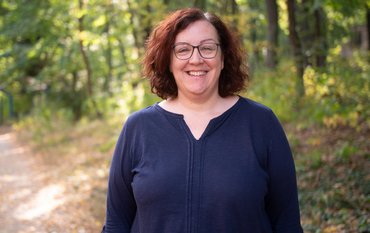Today, Monday 4 December, Federal Chancellor Olaf Scholz, in his capacity as Member of the Bundestag for his constituency, and Brandenburg's Research Minister Dr Manja Schüle visited the GFZ German Research Centre for Geosciences, the Potsdam Institute for Climate Impact Research (PIK) and the GFZ spin-off DiGOS on Telegrafenberg. The intensive exchange focussed on topics relating to the energy transition.
In a joint discussion with Scientific Director Prof Susanne Buiter and GFZ geoenergy experts Prof Ingo Sass and Dr Cornelia Schmidt-Hattenberger, Chancellor Olaf Scholz and Minister Manja Schüle discussed the topics of geothermal energy and underground hydrogen storage. Administrative Director Dr Bettina Hörstrup spoke on behalf of the PIK, and Prof Gunnar Luderer reported on and discussed the latest findings on the transformation towards a climate-neutral energy system. DiGOS Managing Director André Kloth then took the guests high above the roofs of the Telegrafenberg to view a laser ranging station for satellites - also important for the GFZ environmental and climate monitoring satellite missions.
Federal Chancellor Olaf Scholz was impressed by the visit to the research facilities on the Telegrafenberg:
"Not only did I get to see some impressive science, I also learnt a lot. I got answers to many questions that have been bothering me for a long time. We have set ourselves the goal of achieving a climate-neutral economy by 2045 and remaining an economically successful country that sells its technologies worldwide. The technologies of which I have learnt a few additional aspects today play a major role in this: firstly, geothermal energy, where there is huge potential in Germany to ensure a good supply of heat. There is a lot of research behind this, which is useful and important for us. The same applies to the issue of hydrogen supply. To make this possible, we have introduced legislation to allow billions of euros to be invested in a hydrogen network in Germany. The system required for this also includes the possibility of storing hydrogen. I have also gained many additional insights into this here. They will be very helpful for what we do specifically in politics."
Brandenburg's Science Minister Dr Manja Schüle was also impressed after the visit:
"Brandenburg is at the forefront with its scientific institutions in the fields of sustainability, bioeconomy, resource conservation, energy alternatives and climate change. And that's a good thing. After all, for Germany to be climate-neutral by 2045, we need to almost completely dispense with fossil fuels. To get there, we need clever and innovative scientists with passion and excellence - like those at the Telegrafenberg in Potsdam. Both the GFZ and PIK are researching scenarios, technologies and strategies for the energy transition - and the survival of the Earth. And the GFZ spin-off DiGOS Potsdam GmbH is aiming for space with its innovations: it is developing laser ground stations that can be used to calculate the trajectory of space debris and thus avoid collisions with satellites - a unique selling point throughout Europe. Three facilities - three institutions of the future."
The Scientific Director of the GFZ, Prof Susanne Buiter, said:
"Whether for the utilisation of geothermal energy or for the storage of hydrogen in industrially relevant quantities: We need the geological subsurface for the energy transition. Decisive steps are now needed both in research and in the implementation of projects on a pilot and industrial scale. We are therefore very pleased about the great interest shown by Federal Chancellor Olaf Scholz and Minister Manja Schüle in these important topics and about the well-founded and constructive dialogue."
Background to the topics of discussion
Energy turnaround topics at the GFZ
Introduction by the Scientific Director Prof Susanne Buiter
Geothermal energy
The heat transition can succeed with geothermal energy: Geothermal energy, the utilisation of geothermal heat, is regenerative, low in CO2 and base-load capable, i.e. not dependent on the weather and always (24/7) available. As an indigenous resource, it reduces dependence on energy imports. With its research, the GFZ is making decisive contributions to optimising and increasing efficiency as well as to further developing the technology and improving underground knowledge.
Prof Ingo Sass, Head of Section 4.8 Geoenergy, GFZ
Hydrogen storage underground
Hydrogen is set to play an important role as an energy source in the future. In order to be able to store hydrogen on the scale required for industrial value chains, geological underground storage is essential. The GFZ is planning a demonstrator project in Brandenburg to investigate the effects on the subsurface and the optimal connection to the energy industry, the raw materials industry and potential H2 users in the mobility sector.
Dr Cornelia Schmidt-Hattenberger, working group leader in Section 4.8 Geoenergy, GFZ
Energy transition topic of the PIK
Introduction by the Administrative Director Dr Bettina Hörstrup
The transformation to a climate-neutral energy system
Germany must almost completely phase out the use of fossil fuels by 2045. At the same time, the rapid innovation in climate-friendly technologies also offers great opportunities for Germany. Based on findings from the BMBF-funded Ariadne project, Prof Gunnar Luderer has explained the effects of transformation and innovation on the energy system, what progress is already being made and where there is still a particularly great need for action.
Prof Gunnar Luderer, Head of the Energy Systems Working Group, PIK
Tour of DiGOS
DiGOS is a GFZ spin-off company and a world leader in the development of satellite laser ranging stations (SLR). SLR stands for the high-precision measurement of the distance between a ground station and a satellite using laser pulses. Another field of application for DiGOS technology is the high-precision orbit determination of dangerous space debris for collision avoidance with satellites. All of this is also important for the GFZ's environmental and climate satellite missions. DiGOS has already supplied turnkey SLR stations to the European Space Agency (ESA) and the Japanese Space Agency (JAXA) and is currently developing an SLR station for the European satellite navigation system Galileo.
André Kloth, Managing Director DiGOS




![[Translate to English:] Gruppenfoto auf Dach](/fileadmin/_processed_/d/a/csm_231204-GfZ-Scholz-R5CS0171_DiGOS-SLR-Station_Reinhardt-Sommer_b3f16d4144.jpeg)








![[Translate to English:] [Translate to English:] Abror Gafurov von dem Schriftzug "Welcome to Azerbaijan" und den UN und COP Logos](/fileadmin/_processed_/2/5/csm_2024_11_Baku_COP29_Abror_Gafurov_1042faec82.jpeg)


![[Translate to English:] Martin Herold standing in front of the library on the Telegrafenberg](/fileadmin/_processed_/c/d/csm_Martin_Herold_d385ee4dd9.jpeg)
![[Translate to English:] Many people are listening to a presentation in the GFZ lecture hall.](/fileadmin/_processed_/c/a/csm_1_Bild1_hell_b9c0e9f5ed.jpeg)






![[Translate to English:] Both scientists sitting on stools in front of a wall of books in the Telegrafenberg library](/fileadmin/_processed_/6/6/csm_Buiter_Castell_DORA_4_e87cb1ea18.jpeg)
![[Translate to English:] Gruppenbild mit 4 Personen](/fileadmin/_processed_/8/d/csm_20241017_GFZ-Emmerman-Medal-005_web_reinhardtundsommer_21a414fa4a.jpeg)






![[Translate to English:] Ice landscape with five red tents](/fileadmin/_processed_/8/9/csm_Zeltlager_auf_dem_Eis_Urheberin_Jenine_McCutcheon_5ced2d523b.jpeg)


